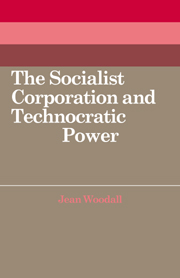 The Socialist Corporation and Technocratic Power
The Socialist Corporation and Technocratic Power Published online by Cambridge University Press: 07 October 2011
It might well appear that the events of 1980 in Poland have very little to do with the process of industrial integration and concentration begun in 1958. The immediate cause of the strikes that spread like a tidal wave from the west of Warsaw to Lublin, the Baltic Sea ports and from thence to Lower and Upper Silesia might ostensibly lie in the announcement on 1 July 1980 of increases of 30–90% in the price of meat products sold in commercial shops, but in reality the underlying economic forces involved broader issues of individual and collective consumption, civil rights and democracy in industrial relations. We will consider these in the context of the events that brought about the downfall of the government of Edward Gierek at the IV Central Committee Plenum of 24 August 1980 and his replacement by Stanisław Kania, and developments that have taken place up until the end of 1980.
The most outstanding result of this protest was Solidarnosc, the independent self-governing trade union born in October 1980, and finally registered as such on 10 November 1980. Unlike the established trade unions it was formed from the grass-roots upwards, being a federation of local committees to which branches formed at particular places of work could affiliate.
To save this book to your Kindle, first ensure [email protected] is added to your Approved Personal Document E-mail List under your Personal Document Settings on the Manage Your Content and Devices page of your Amazon account. Then enter the ‘name’ part of your Kindle email address below. Find out more about saving to your Kindle.
Note you can select to save to either the @free.kindle.com or @kindle.com variations. ‘@free.kindle.com’ emails are free but can only be saved to your device when it is connected to wi-fi. ‘@kindle.com’ emails can be delivered even when you are not connected to wi-fi, but note that service fees apply.
Find out more about the Kindle Personal Document Service.
To save content items to your account, please confirm that you agree to abide by our usage policies. If this is the first time you use this feature, you will be asked to authorise Cambridge Core to connect with your account. Find out more about saving content to Dropbox.
To save content items to your account, please confirm that you agree to abide by our usage policies. If this is the first time you use this feature, you will be asked to authorise Cambridge Core to connect with your account. Find out more about saving content to Google Drive.